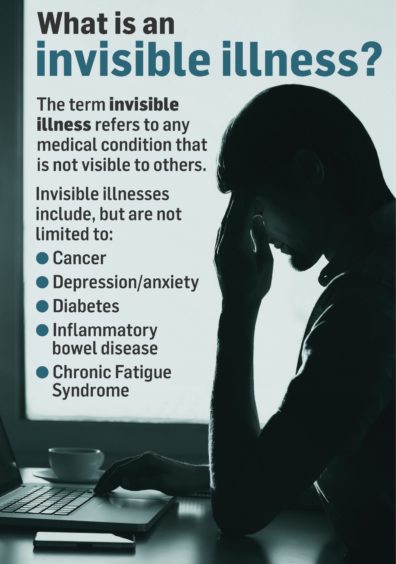A call has been made for workplaces to be more mindful of employees living with invisible illnesses.
The Not Every Disability is Visible campaign asks employers to do more to support staff who may have illnesses or disabilities which are hidden to the outside world.
Launched by Crohn’s & Colitis UK – which supports people living with Inflammatory Bowel Disease – the charity states that one in seven people in the UK live with a chronic invisible condition, all while trying to maintain a normal working life.

‘Not just the right thing to do morally, but also commercially’
Jane Innes, course leader and personal tutor in Msc Human Resource Management at Robert Gordon University, believes employees should be able to “thrive” no matter their health conditions.
“If you want to keep the best people in an organisation then you need to make sure it’s inclusive,” she said.
“People should be able to join an organisation and thrive within it, irrespective of what health challenges they have.
“It’s not just the right thing to do morally, but also commercially as it helps to retain employees.”
As part of its campaign, Crohn’s & Colitis UK is asking north-east businesses to pledge to introducing a number of measures identified by the charity.
The measures include appointing an invisible condition representative as a point of contact for employees, training staff on invisible conditions, empowering line managers and HR teams with the confidence to discuss hidden illnesses and introducing remote or home working post-Covid.
Speaking of the proposed measures, Jane commented: “The initiative supports the right kind of environment and it does sound good.
“Workplaces have got to have the right kind of organisational culture. By that I mean they need to have an inclusive culture.
“Secondly, they need to have the right policies in place which recognise people have different needs.
“Finally, line managers must be equipped to have appropriate conversations. I think you need to have all three aligned. One without the other isn’t really going to work.”
Jane added: “Ethics, equality and inclusiveness – these are very much embedded within our course curriculum.”
The benefits of flexible working
Although the pandemic has impacted businesses hugely, Crohn’s & Colitis UK’s campaign stresses that home working should be maintained post-Covid.
Working from home can prove to be less stressful for those living with hidden disabilities, particularly if they suffer from invisible illnesses such as Inflammatory Bowel Disease, which may require a person to use the toilet frequently throughout the day.
“A flexible working environment is the direction of travel. It’s maybe a way of being more inclusive of employees to – I think society is starting to recognise that,” Jane said.
“Home working undoubtedly does provide more flexibility for people with invisible conditions – it makes their lives easier.”
Debbie Muirhead, 50, knows all too well the difficulties of living and working with an invisible illness, as she was diagnosed with Ulcerative Colitis – an inflammatory bowel disease – aged 38.
Owner of Aberdeen’s Clearview PVC Windows & Doors, Debbie also runs a business and can therefore see things from the perspective of both an employer and someone who juggles her health alongside working.
“Employers really have to be empathetic and understanding of employees,” said mum-of-two Debbie.
“No one knows what’s going on in someone’s life at the end of the day. But being understanding of people’s health really can be key to retaining staff.”
Debbie, of Ferryhill, believes it’s important employees try to be open with their workplaces about any health conditions. But she stressed it’s equally as vital for employers to be open to these conversations and willing to learn more about what their employees might be going through.
She said: “It’s difficult because some people are very private and don’t want to talk about their health openly.
“But my advise would be to try and be open and honest with at least one manager or HR employee so someone knows what is going on.
“Employers can’t help or be more understanding if they simply don’t know.
“It would also be helpful if employers took interest in an employee’s condition so they have a better understanding.
“In my opinion, it’s imperative an employer does this because you need to understand what that person is going through.
“Often people just don’t understand illness unless it’s spoken about – with invisible illnesses especially, you can’t see the pain or suffering.”
Encouraging understanding
Policy lead for Scotland and Northern Ireland at Crohn’s & Colitis UK, Elaine Steven, said: “We want companies across Scotland to sign up to our campaign to better acknowledge, understand and empower people living with invisible conditions, such as Crohn’s and Colitis.
“We’ve created an extensive range of free tools and resources to help companies do this.
“No longer should it be down to luck that someone has a supportive manager – a simple pledge to sign up to the campaign can have a huge impact on the workplace wellbeing of those with invisible conditions.”


